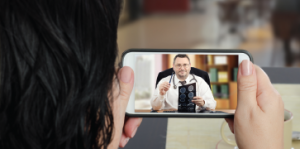
verbaska / shutterstock.com
Dominick Sudano, MD, an assistant professor at the University of Arizona and rheumatologist at Banner University Medical Center, Tucson, Ariz., knows how tough it is for patients living in remote areas to obtain a rheumatology consultation.
“It’s not unusual for patients living in rural areas of Arizona to wait four to six months for a rheumatology consult and then drive 50–100 miles to an appointment,” says Dr. Sudano, who adds that long distances and wait times often result in delays in diagnosis and treatment, as well as insufficient disease management.
According to the Centers for Disease Control and Prevention (CDC), one-third of adults in the most rural areas of the U.S. have a form of arthritis, including fibromyalgia, rheumatoid arthritis and osteoarthritis.1 In the new Rheumatic Disease Report Card: Raising the Grade on Rheumatology Care in America, released in September 2018 by the ACR’s Simple Tasks awareness campaign, Arizona received an overall C grade.2 The report card assigns letter grades to states according to their progress in providing adequate access to rheumatology care, ensuring rheumatic disease care is affordable and encouraging healthy lifestyle habits that ease the burden of rheumatic disease.
With Arizona receiving a D in both access and affordability, the report card went on to say action is needed to improve quality of life for people in Arizona who live with rheumatic diseases.
Dr. Sudano is working toward that change by leading a telemedicine-based ECHO (Extension for Community Healthcare Outcomes) program at the University of Arizona, employing expansion techniques and telemedicine. Beginning in September 2017, Dr. Sudano has met with 30 primary care providers via webinars for two hours each month. This forum allows regional medical staff to ask questions, learn about best practices for treating many rheumatic conditions and obtain consults on difficult-to-treat cases.
Expanding the Scope of Care
Improving access to specialty care for those with rheumatic diseases remains an ongoing challenge. Experts say rheumatologists are in short supply in the U.S., and the aging baby boomer population, combined with many rheumatologists reaching retirement age, is expected to make access to care even more scarce. A summary of the ACR Workforce Study in Arthritis & Rheumatology found that as of 2015, patient demand for rheumatologists exceeded clinician supply by the equivalent of 700 full-time providers.3 The study goes on to predict the shortage will only worsen by 2030.
The solution, according to the study, is to look at innovative ways to expand the rheumatology workforce. This includes workforce expansion techniques, such as care provided by nurse practitioners and physician assistants (see story on p. 18), and the use of telemedicine.
In 2018, Amy Waer, MD, medical director of the Arizona Telemedicine Program (ATP), was awarded an educational grant from Eli Lilly to launch a pilot ECHO program. The program was designed to train primary care physicians in remote locations how to diagnose and treat rheumatic diseases. Arizona has one of the lowest concentrations of rheumatologists in the country, with only one practicing rheumatologist for every 139,000 people (as opposed to Maryland and Massachusetts, which have one rheumatologist for every 20,000 people).
“We [the ATP, the University of Arizona College of Medicine and the University of Arizona Center for Rural Health], wanted to see if there was a way to make rheumatology consults more accessible in outlying areas,” Dr. Sudano says. “We’re training staff at rural clinics how to triage rheumatic disease cases, and to facilitate early referral and management.
“Our hope is that community clinicians will increase their knowledge of rheumatology and feel comfortable treating these patients in their own communities,” Dr. Sudano says. “They would still refer complex cases to a rheumatologist, but the wait should be shorter, since more cases could be treated on a local basis.”
The Arizona Rheumatology program is part of Project ECHO, a guided practice telemedicine model launched in 2003 by Sanjeev Arora, MD, a liver specialist at the University of New Mexico (UNM) Health Sciences Center, Albuquerque. Dr. Arora launched Project ECHO after seeing that many patients with hepatitis C weren’t getting the care they needed because of a lack of specialists.
In 2016, President Obama signed into law the bipartisan bill S.2873, the ECHO Act, to expand Project ECHO nationwide.4 Today, Project ECHO continues its mission of developing the capacity of primary care physicians to safely and effectively manage chronic medical conditions within their communities. The ECHO model is expanding across disease and specialty areas and is now used in more than 130 hubs in the U.S., as well as in 23 other countries. In addition to rheumatology, ECHO programs focus on asthma, geriatrics, substance abuse, obesity and more.
Three years ago, Bone Health TeleECHO, a weekly online videoconference, was launched at UNM to link experts and learners with a focus on presentations and discussions of real but de-identified patients with skeletal disorders. A typical online clinic involves 35–40 participants, and continuing medical education credits are offered at no cost.
For rheumatologists who enjoy sharing their knowledge through teaching, Bone Health TeleECHO provides a platform for doing so. The ECHO Institute at UNM provides support, at no cost, for the development of TeleECHO clinics worldwide.


